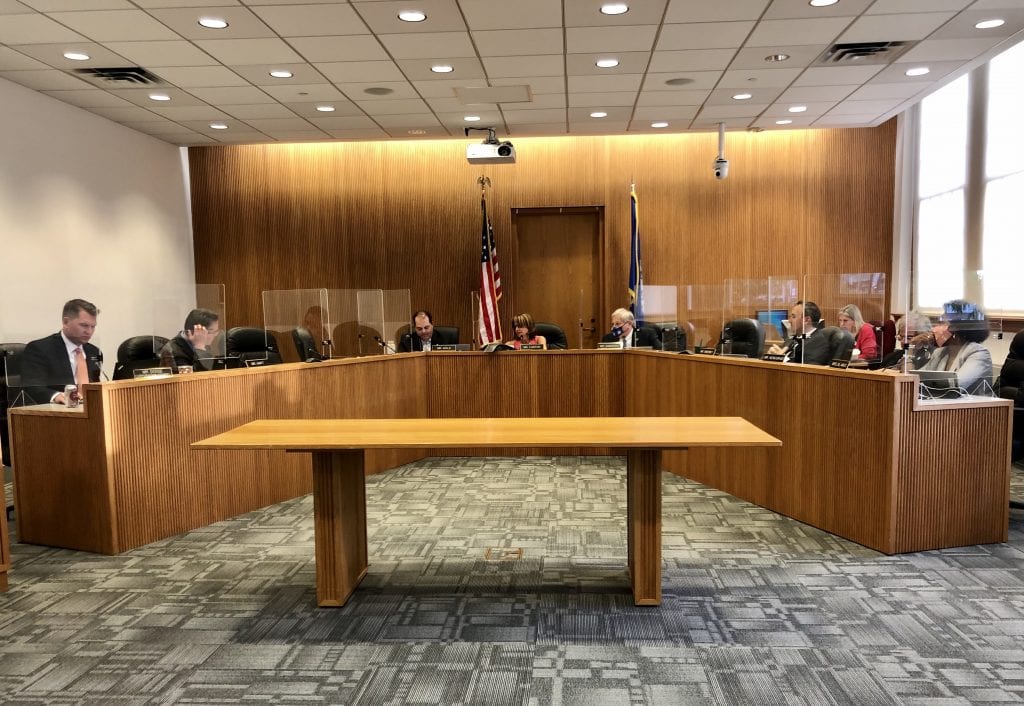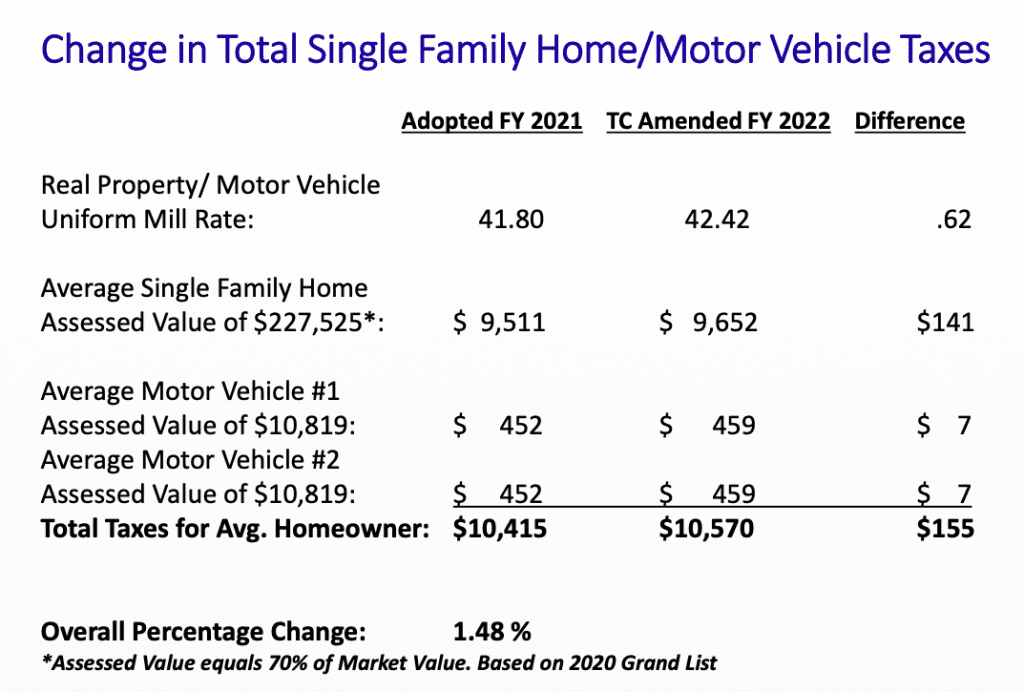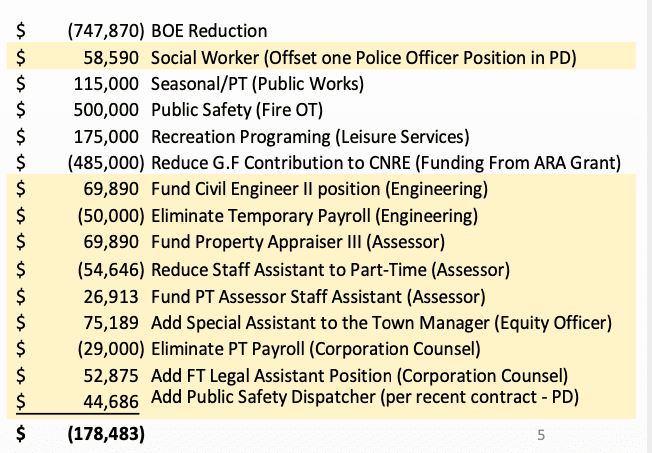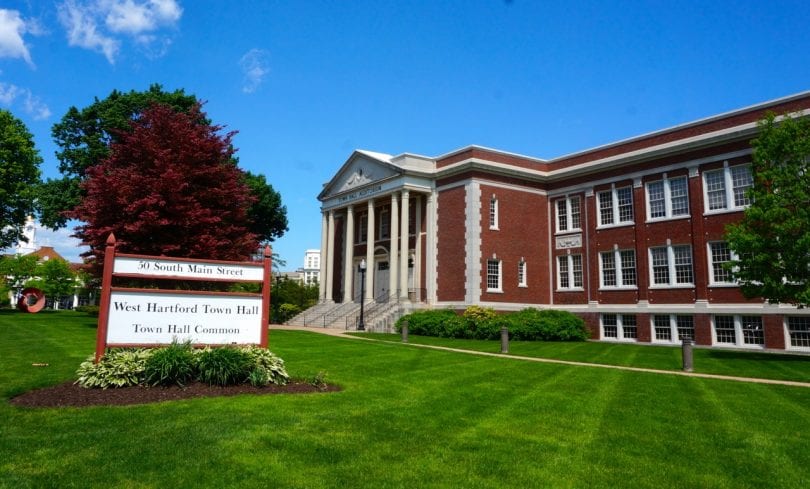The West Hartford Town Council voted 7-2 Tuesday night to adopt a $308.4 million FY2022 budget with a mill rate that increases by 0.62 mills from the previous fiscal year.

West Hartford Town Council budget adoption meeting, May 25, 2021. Photo credit: Ronni Newton
By Ronni Newton
The average West Hartford taxpayer will see their tax bill increase by 1.48% in the next fiscal year, following the Town Council’s 7-2 vote Tuesday night to adopt a $308.4 million FY2022 budget that restores some vacant positions and adds a diversity and inclusion officer who will report directly to the town manager.
The new mill rate is 42.42 mills, an increase of 0.62 mills
The six Democrats – Mayor Shari Cantor, Deputy Mayor Leon Davidoff, and councilors Beth Kerrigan, Liam Sweeney, Ben Wenograd, and Carol Blanks voted in favor of the budget, as did Lee Gold, who resigned from the Republican Party earlier this month and plans to resurrect A Connecticut Party.
Republicans Mary Fay, newly appointed as minority leader, and Chris Williams – both of whom attended the meeting virtually – voted against the budget.
Kerrigan also attended the meeting virtually.
Town Manager Matt Hart said the budget “serves as a recovery tool for the town from the pandemic,” and provides services essential for the quality of life that make West Hartford what it is today. “We don’t want to rest on our laurels. … We want to continue to improve,” he said, and to invest responsibly in infrastructure.
The vote
Davidoff, who chairs the Council’s Finance and Administration Committee, said the final proposal is a fiscally responsible municipal budget. “This Council has focused on finding efficiencies while at the same time providing the services that our residents expect and deserve.”
Those priorities, he said, including maintaining the town’s excellent public schools, remaining a regional leader for economic development and encouraging grand list growth, investing in the excellent public safety departments, addressing system racism and affordable housing, and investing in capital improvements.
With this budget, Davidoff said, “We have funded those priorities.”
Services – trash collection, health insurance, and contractual obligations – increase in price, he said. While residents may complain about the roads, there are 209 miles of road and most would not want to have to pay what it would cost for them to be perfect.
“Fiscally responsible, fiscally astute, fiscally sound … that’s what it’s all about,” Davidoff said.
Fay, also a member of the Finance and Administration Committee, said she had hoped the budget could get to a point where there would not be a mill rate increase. “I think there’s some things that we could continue to work on in the future for sure,” she said.
“This is a budget that has both responsiveness, compassion, and creativity,” Sweeney said, and that’s possible because of foresight and resources, the investments the town has made.
When the pandemic hit, “the schools immediately rolled out a flawless plan of getting people food and computers,” the town staff got everyone online, and Corporation Counsel Dallas Dodge interpreted endless executive orders.
The town led with compassion, and Cantor was the epitome of that, he said.
Holding a Juneteenth event in the midst of the pandemic, and, most visibly, responding to the needs of restaurants, “was all done with creativity and thinking outside the box.”
“Probably the most important role we councilors have is deciding how much money is going to the town,” Kerrigan said. “We have survived the pandemic and came through even stronger.”
“For me the budget vote comes down to sustainability,” Williams said. “For me the bottom line is that I feel the budget falls short in meeting the sustainability,” he said, noting that he would have preferring a more generous use of ARP funds to avoid a mill rate increase.
The town also need to “focus on not creating structural deficits,” Williams said, adding that many new positions created end up being permanent.
Blanks said so many people have suffered because of the pandemic. “This is the time when government provides the assistance and support when needed.”
The issue of race and discrimination – institutional, systemic, hatred – “these are deeply rooted in our society like a nasty weed that you can’t pull free, but it’s up to us to make a change,” Blanks said.
With the diversity and inclusion officer, the town will be able to address every aspect of equity. “It is high time that we examine and evaluate ourselves because when we know better, we can do better,” she said.
The year has been very difficult and we’ve all experienced loss,” Gold said. “We can’t ignore the fact that there has been an enormous strain on our town,” and many people are still without jobs.
While he voted in favor of the budget, “We need to ask ourselves how can we do better?” Gold said.
Continuing to address the pension plan structure to focus on defined benefits is one way, he said, as is strategic consolidation of buildings. “We can do more with less. … We should be taking this opportunity to streamline,” said Gold.
The Council should “move forward with the budget proposed to work toward a better future in West Hartford,” he said.
“I was not optimistic a year ago but I feel better now,” said Wenograd, noting that one of the reasons is “I got my jab,” and urging all who are eligible to get vaccinated.
The past year is a testament to the “critical role of community and responsible leadership,” Wenograd said, with initiatives like handing out masks in the Center, going door-to-door to sign people up for vaccines, putting up a tent at Town Hall to hand out food, and installing a window so people could do business with the Building Department without going into the building
“What our schools pulled off this year is just amazing, more than we could have possibly hoped,” said Wenograd. He said he is convinced that we are funding the schools in the way they need to be funded. “The fact that Conard and Hall are top 10 in the state is not an accident.”
The town manager presented a budget that assessed the town’s needs “and then it was properly left up to elected officials to make value judgements,” he said, voicing support for the use of the ARP funds as adopted.
Wenograd added his support for the diversity and inclusion officer. The Council voted to declare racism a public health crisis, and “you can’t say that and not mean it.”
The budget is “prudent and responsible, preserves essential services, and puts us in a good position for the coming year,” he said.
Cantor added her reflections on the past year, her thanks to staff and volunteers, and her support for the budget.
“We need to make sure we’re governing the best we can for this very special community. … I do think this budget is in the best interests of the town.”
West Hartford continues to receive a steady stream of accolades, and was the only Connecticut town mentioned in not one, but two New York Times articles this past year, she said. “People don’t want to just go out here, they want to live here, invest here …Lots of people are looking at us and saying we’re getting it right.”
Throughout the past year the town has been creative, and collaborative, citizen centric, and “a government of possibilities,” Cantor said. At the same time there are many people in need.
“Dollars speak our values. We can’t just say we care about education and then not fund it … if we care about racial equity we need to fund these positions,” Cantor said.
“We are on a path of recovering and reimagining, we are not going to go back to where we were.”
Looking toward the future, we are going to invest in things that will save money down the road, she said, noting that the Pension Obligation Bonds will avoid a $4 million proposed increase next fiscal year.
How will the budget impact taxpayers?
The average homeowner with two vehicles will see taxes increase by $155, or 1.48%, (from $10,415 to $10,570) for FY2022. In West Hartford, the “average” homeowner based on the 2020 Grand List has a home assessed at $227,525, and two vehicles assessed at $10,819 each.

The roughly $308.4 million budget includes spending on town services of $117.2 million, $175.6 million for the schools, and $15.6 million for capital financing.
Changes to the budget
The adopted FY2023 budget, which will take effect on July 1, 2021, totals $308,442,028, an increase in spending of $8,195,270 (2.73%) over the previous fiscal year.
The Town Council met multiple times as a committee as a whole, and after examining each department’s budget, the spending plan has been reduced by $178,483 from the $308,620,511 budget Hart proposed to the Council on March 11, which would have required a 3.25% tax increase.

“I did recommend reinstatement of some key positions that we left vacant,” Town Manager Matt Hart told We-Ha.com. In order to minimize the impact, the new positions will be filled effective Oct. 1 rather than July 1, he said.
The positions include a social worker to directly work with the police department to address issues such as panhandling, seasonal part-time employees in Public Works to maintain parks, a civil engineer which will be needed as the town allocates ARP funds to key projects, a property appraiser as revaluation gets underway, a legal assistant for the Office of Corporation Counsel to handle paralegal functions that attorneys are spending time on now, and a public safety dispatcher to ensure adequate response. Several of the positions are associated with offsets to temporary payroll.
The diversity and inclusion officer position is brand new, Hart said. “It’s become more common nationwide, but still relatively new in Connecticut on the municipal side.” The individual who will fill the position will be tasked with coordinating equity, diversity, and inclusion efforts across town departments, with West Hartford Public Schools Director of Diversity Advancement Dr. Roszena Haskins, and with the community – to “knit everything together,” he said.
Hart said the budget also adjusts fire department overtime, which has far exceeded the budget amount in the past, and also adds $175,000 for recreational programming.
The amount of general fund contribution to the Capital Non-recurring Expense (CNRE) fund has been further reduced from his original proposal, Hart said, and only incorporates the first year cost of body cameras for the police department. The expectation is that ARP funds will be able to be used for some projects that would otherwise be CNRE.
Peter Privitera, West Hartford’s director of finance, said the possibility exists that other funding sources will become available – such as state grants – for some of the budget additions, which will then offset the town’s costs.
The Board of Education’s budget of $175,556,055, was incorporated as adopted last month, with the $747,870 the Board trimmed from Superintendent Tom Moore’s original proposal. The cuts were achieved through a combination of projected savings for health and medical expenses due to rates and the number of participants in the plan (reduction of $225,000), offsetting a $350,000 estimated deficit in the nutrition services fund with American Rescue Plan Act funds, and using $172,870 in federal ESSER II (Emergency and Secondary School Emergency Relief) funds to pay for two additional elementary school sections that will be needed next year.
Revenue changes
On the revenue side, the combination of $4,135,000 of American Rescue Plan Act funds plus $365,572 in additional state aid recommended by the legislature’s Appropriations Committee, most of which is an increase in the town’s Educational Cost Sharing formula grant, will fund roughly $3.7 million of the additional spending.
American Rescue Plan Act
The Council had held off adopting its budget awaiting guidance from the Treasury Department regarding use of $25,004,570 in American Rescue Plan (ARP) funds which the town will receive and can use through 2024. The ARP Act was approved by Congress and signed by President Joe Biden in March, and guidance was received May 11.
Privitera told We-Ha.com that the decision was made to apply ARP funds in FY2022 to replenish lost revenue for government operations – a use permitted according to guidance the town received.
There are still many questions about what the funds can and can’t be used for, Privitera said. “The last thing we want to do is misinterpret the guidelines.”
There are specific items the town may be able to use the ARP funds for – like stormwater and broadband infrastructure – but because those projects may ultimately be able to be regional or statewide initiatives, the town is going to hold off on committing funds until further details are available.
In addition to the town’s ARP funds, the schools will receive another roughly $10.3 million.
Hart and Privitera presented the Council with suggested “guiding principles” for use of the remainder of the ARP funds – which they recommend be used to not only restore lost revenue and restore key positions, but also as “funding for projects and initiatives to promote policy goals, to have lasting impact.”
The projects and initiatives will impact sustainability, equity and diversity, economic vitality including arts and culture, health and human services, public safety, technology, and quality of life such as amenities for parks and public spaces.
Some specific suggestions will come from staff, and the Council will also likely solicit public opinion through the recovery committees (Economic & Workforce and Social & Community) that were established last year.
Privitera also noted that while the town will be applying more than $4 million of ARP funds as a one-time addition to revenue this year, it’s being done so that there will not be a giant hole in the budget in FY2023. “We’re not just grabbing this money and not looking down the road,” he told We-Ha.com. Some anticipated savings are expected next year from the issuance of Pension Obligations Bonds and changes in the health insurance program, Privitera said, and some ARP funds would also be able to be used in that year’s budget if needed.
Each Council member who spoke thanked town staff – particularly Privitera and the Finance Department staff, West Hartford-Bloomfield Health District Director Aimee Krauss, the fire and police departments, Town Clerk Essie Labrot, West Hartford Community Interactive Executive Director Jen Evans and staff, Corporation Counsel Dallas Dodge, Town Clerk Essie Labrot, Superintendent of Schools Tom Moore and the Board of Education, and other staff and officials for their extreme dedication throughout the pandemic.
Cantor’s leadership, and the countless hours she spent listening to residents and participating in virtual meetings, was also commended by Council members.
“Under Mayor Cantor’s leadership we are going to issue Pension Obligation Bonds to address our unfunded liability head on, and if our actuaries are right we will save tens of millions of dollars,” Davidoff said.
Like what you see here? Click here to subscribe to We-Ha’s newsletter so you’ll always be in the know about what’s happening in West Hartford! Click the blue button below to become a supporter of We-Ha.com and our efforts to continue producing quality journalism.








